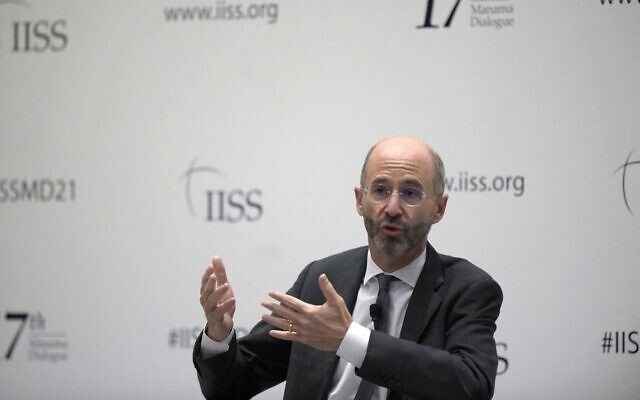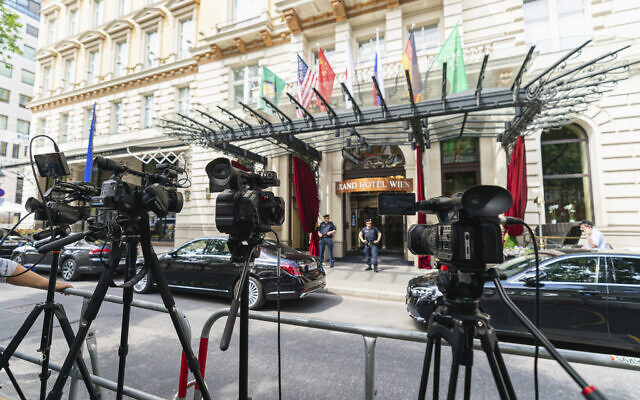Negotiations to resume Monday in Vienna; Rob Malley hints at US action if Islamic Republic gets ‘too close for comfort’ to breakout

WASHINGTON — The United States will not “sit idly” if Iran drags its feet on negotiations to revive the 2015 nuclear accord, the US special envoy said this week, as talks get set to resume after a prolonged hiatus.
US negotiator Rob Malley said Washington would “respond accordingly” if Iran balked at advancing talks while pushing too far ahead with nuclear enrichment activity, which has continued to ramp up.
“If they start getting too close, too close for comfort, then of course we will not be prepared to sit idly,” Malley told National Public Radio in excerpts released Tuesday.
Iran will return to talks in Vienna with world powers on Monday after a five-month gap following the election of an ultra-conservative president, Ebrahim Raisi.
The negotiations come after the head of the International Atomic Energy Agency, back from a visit to Iran, said there had been no progress in talks on disputes over monitoring the country’s program.
The IAEA told member nations in its confidential quarterly report last week that Iran has an estimated stock of 17.7 kilograms (39 pounds) of uranium enriched to up to 60% fissile purity, an increase of almost 8 kilograms since August. The highly enriched uranium is only a short technical step from becoming weapons-grade.
US President Joe Biden’s administration opened the indirect talks earlier this year in hopes of returning the United States to a 2015 nuclear accord trashed by predecessor Donald Trump, but has failed to reach an understanding with Iran.
“We’re prepared to get back into the deal and to lift all of the sanctions that are inconsistent with the deal. So if Iran wants to get back into the deal, it has a way to do that,” Malley said.

“If it doesn’t want to get back into the deal, if it continues to do what it appears to be doing now, which is to drag its feet at the nuclear diplomatic table and accelerate its pace when it comes to its nuclear program, if that’s the path it chooses, we’ll have to respond accordingly,” he added.
The negotiations are being held indirectly, with an EU envoy shuttling between Malley and the Iranian delegation, which refuses to meet the US representative face-to-face.
Iran has demanded a lifting of all sanctions, but the Biden administration says it is only discussing measures imposed by Trump as part of the withdrawal from the nuclear deal, including a sweeping unilateral US ban on all other nations buying Iran’s key export of oil.
Israel, which fiercely opposed the 2015 deal negotiated by president Barack Obama, has waged a reported sabotage campaign against Iran and threatened military action. On Tuesday, Prime Minister Naftali Bennett indicated that Israel was prepared to break with the US and other allies to take action against Iran, if needed.
US Secretary of State Antony Blinken has spoken of “other options,” although Malley in the interview made it clear the United States was thinking foremost of economic pressure.
As reported by The Times of Israel
